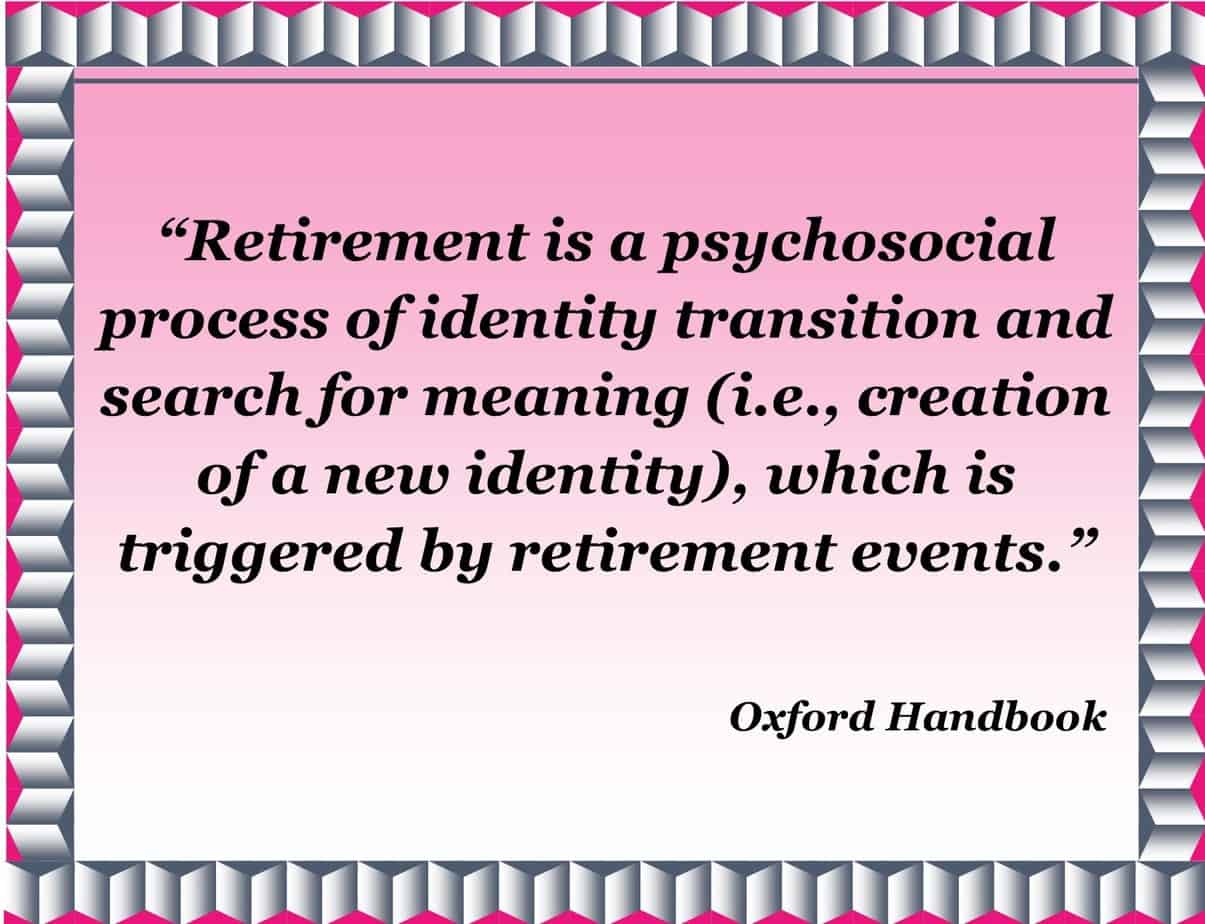The day you retire is a life changing event. Mostly for the better as who doesn’t want to shed all those stresses and pressures?
It’s one aspect often overlooked when talking about losing identity after retirement. All too often our self-perception has become intertwined with what we did.
Ways of dealing with loss of identity after retirement:
What is Losing Your Identity in Retirement?
After the initial excitement of leaving work, it’s only natural to feel somewhat off kilter. For decades, your job provided daily structure and the sense of being part of something greater than yourself.
After leaving work, most folks will find themselves in a bit of a vacuum.

If only it were as easy as managing the transition from work to non-work. For some, it feels like everything they were comfortable with changes overnight.
Their day-to-day routine, work friendships, and relationships. Not that these are bad things, yet they can throw you off when you didn’t see them coming.
As much as everyone aspires to “retire and enjoy the good life”, it isn’t exactly a high-status position. In fact, some of the younger generations might even view us as “over-the-hill” or no longer relevant. OUCH, that one stings!
Perhaps for the first time you’re questioning yourself and what the future will bring.
Who's at Risk?
Everyone will be dealing with loss of identity after retirement at some level. From a societal perspective, it feels like we’ve gone from being important to something less than.
Some careers are more susceptible, such as ones with high authority and importance. When the status quo changes their influence, connections, and self-worth can feel compromised.
Classic examples are firefighters, law enforcement, and the military. Not only putting their lives on the line, they played critical and vital roles. Executives and other leadership positions also may find the transition difficult.
Better Understanding All This
Healthline identifies signs you might be experiencing an identity crisis. These include:
While it’s normal to question yourself, it becomes an issue when it begins to affect your daily thinking and functioning. Layered upon this are various stressors which can turn life upside down. These can include:
The Oxford Handbook provides further insights with an identity-based perspective on retirement. They suggest it is a “life transition” encompassing personal, social and reference group changes. Their definition:

They further suggest this is an opportunity to rethink and reorient to a more current version of our self-identity. Even after retiring, it’s only natural to still associate yourself with your profession.
Especially if you had a higher status position such as a doctor or engineer. There’s nothing wrong with taking pride in all your accomplishments.
The problem arises for those who get “stuck” and no longer feel relevant. Coupled with vast amounts of free time, this can lead to a downward spiral.
This is a Transition
Each of us will experiences things differently. We also need to understand this is a transitionary process. Although I shared the story of my friend and his new-found purpose in Why Retirement is Great, it deserves a closer look.
With 35 years of service under his belt, he was a prime candidate for the next round of downsizing. Sweetened with a severance package, he was ecstatic to leave the madness behind. As I recall, he practically danced out the door.
Those first months were wonderful. Camping for weeks on end enjoying the great outdoors. Purchasing a Ducati motorcycle, road trips and adventures with the boys. Backyard BBQs with family and friends. This was the good life and the summer flew by.
Then things got interesting. By the fall the novelty began to wear off. Not so exciting anymore and everything became same old same old. Something was missing, this life of leisure wasn’t all it was cracked up to be.
After about a year, he took an executive (non-paid) position with a non-profit organization. Why would he go back to work full-time? It didn’t make sense to me at the time.
In hindsight, this became his “encore” career doing something he loved and making a difference. This was congruent with his self-identity and sense of purpose. The last time we got together (been a while since COVID), he excitedly spoke about the projects he was involved in.
Ways of Dealing with Loss of Identity After Retirement
Retirement is like a crossroads in life when you’re suddenly faced with stuff you didn’t anticipate. Most of the time, it’s an adjustment period as we sort things out. In other situations, it can become debilitating and outside help should be considered.
The worst thing is ignoring or masking serious issues. Left unattended they’ll fester and grow, possibly leading to way worse problems down the road.
Acceptance of Change
Your sense of self-identity isn’t static and changes throughout life. A single event can also immediately impact it, such as a traumatic event. What we can’t do is turn the clock back to return to a former self.
One would think after retiring, we’d all be “happier than clams” (can’t believe I used that old expression!). The reality is everything changes the day we leave work.
Some good and others not so much. For better or worse, we need to accept what we can’t change it and keep moving forward.
Look Within And Explore
Explore your feelings and what is bothering you. Sometimes, it’s hard to put your finger on exactly what isn’t quite right. Some methods to probe deeper include:
Sometimes, it takes time for everything to settle and find clarity. Give yourself permission to feel a little off balance and let any emotions subside.
It’s healthy to understand yourself and what makes you tick. That’s part of growing and evolving into a better person. Another benefit is rebuilding and focusing on the positive aspects of yourself.
Open Yourself to Joy and Happiness
Aren’t these supposed to be your golden years? When you do all those things you’ve always wanted and have fun. It’s often said “The simple things are the best”.
The secret to lasting happiness isn’t how much money you have. Rather, it’s always been about the people in your life and a positive outlook.
Volunteer or Get a Job You Love
Some of the most fulfilled people are those involved in the community. Not only are they making a difference for others, they’re also active and socially engaged.
This also enhances feelings of self-worth and purpose. On a side note, almost half of all volunteer hours are provided by retirees.
Another option would be to get a job doing something you enjoy. For instance, a friend of mine drives the shuttle for a local dealership several days a week.
Besides getting him out of the house, he makes a bit of spending money. In addition, he’s a people person and enjoys the people he meets.
Get Outside Help
Sometimes dealing with loss of identity after retirement is so difficult, you just can’t or shouldn’t do it alone.
Expanding your social circle and getting more active can often make things easier. In other instances, professional help should be considered. Some of these options include:
Closing Thoughts
My focus on dealing with loss of identity after retirement was to provide helpful tips on managing this transition. Little did I realize how complex and interwoven this would become.
The fact is, “who you are” is an ever-evolving process which is further impacted by major life events. Retirement is one of those events.
When you might question your sense of self, what is important, and even your purpose. This is a transitionary process affecting almost everyone.
Some retirees will go through a relatively minor recalibration; whereas others might struggle to redefine themselves. How was it for you? If retirement is still on your horizon, do you anticipate any challenges?


I consulted the first five years after retiring because I thought this would be an issue for me. I had a high profile job, was in the news sometimes and knew all the politicians and business leaders in our state. But now I’m good with letting that go. My volunteer work offers me plenty of social contact. I do recommend the off ramp approach I used, working a few hours a week in a field related to my former career, to ease into the retired world. At least it worked for me.
The off ramp approach is an excellent strategy, Steve. And it sounds like it worked out well for you! Good advice and way to phase in retirement.